高中英语 情态动词专题讲解(有答案)
- 格式:doc
- 大小:74.00 KB
- 文档页数:8
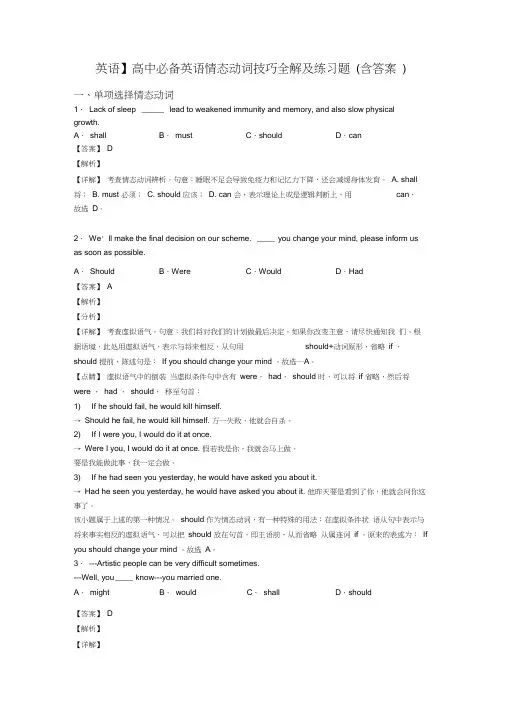
英语】高中必备英语情态动词技巧全解及练习题(含答案)一、单项选择情态动词1.Lack of sleep _____ lead to weakened immunity and memory, and also slow physical growth.A.shall B.must C.should D.can【答案】D【解析】【详解】考查情态动词辨析。
句意:睡眠不足会导致免疫力和记忆力下降,还会减缓身体发育。
A. shall 将;B. must 必须;C. should 应该;D. can 会,表示理论上或是逻辑判断上,用can,故选D。
2.We' ll make the final decision on our scheme. ____ you change your mind, please inform us as soon as possible.A.Should B.Were C.Would D.Had【答案】A【解析】【分析】【详解】考查虚拟语气。
句意:我们将对我们的计划做最后决定。
如果你改变主意,请尽快通知我们。
根据语境,此处用虚拟语气,表示与将来相反,从句用should+动词原形,省略if ,should 提前,陈述句是:If you should change your mind 。
故选⋯⋯A。
【点睛】虚拟语气中的倒装当虚拟条件句中含有were,had,should 时,可以将if 省略,然后将were ,had ,should,移至句首:1) If he should fail, he would kill himself.→ Should he fail, he would kill himself. 万一失败,他就会自杀。
2) If I were you, I would do it at once.→ Were I you, I would do it at once. 假若我是你,我就会马上做。
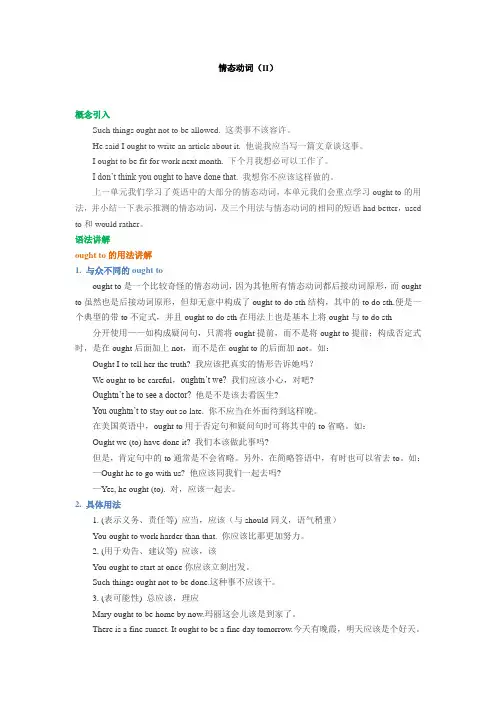
情态动词(II)概念引入Such things ought not to be allowed. 这类事不该容许。
He said I ought to write an article about it. 他说我应当写一篇文章谈这事。
I ought to be fit for work next month. 下个月我想必可以工作了。
I don’t think you ought to have done that. 我想你不应该这样做的。
上一单元我们学习了英语中的大部分的情态动词,本单元我们会重点学习ought to的用法,并小结一下表示推测的情态动词,及三个用法与情态动词的相同的短语had better,used to和would rather。
语法讲解ought to的用法讲解1. 与众不同的ought toought to是一个比较奇怪的情态动词,因为其他所有情态动词都后接动词原形,而ought to虽然也是后接动词原形,但却无意中构成了ought to do sth结构,其中的to do sth.便是一个典型的带to不定式,并且ought to do sth在用法上也是基本上将ought与to do sth 分开使用——如构成疑问句,只需将ought提前,而不是将ought to提前;构成否定式时,是在ought后面加上not,而不是在ought to的后面加not。
如:Ought I to tell her the truth? 我应该把真实的情形告诉她吗?We ought to be careful,oughtn’t we? 我们应该小心,对吧?Oughtn’t he to see a doctor? 他是不是该去看医生?You oughtn’t to st ay out so late. 你不应当在外面待到这样晚。
在美国英语中,ought to用于否定句和疑问句时可将其中的to省略。
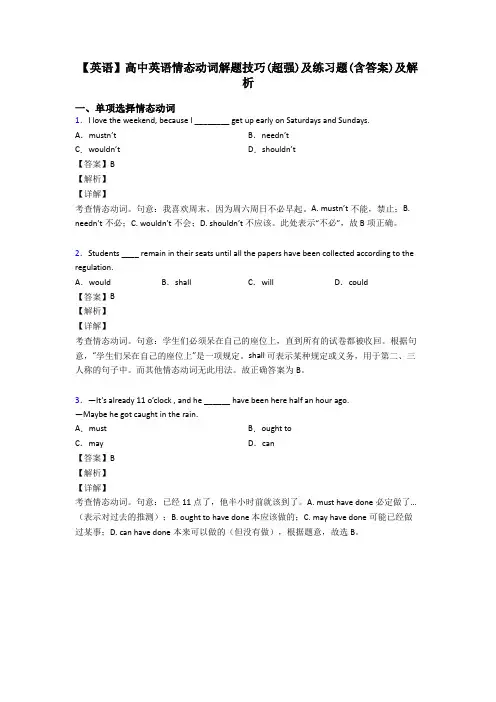
【英语】高中英语情态动词解题技巧(超强)及练习题(含答案)及解析一、单项选择情态动词1.I love the weekend, because I ________ get up early on Saturdays and Sundays. A.mustn’t B.needn’tC.wouldn’t D.shouldn’t【答案】B【解析】【详解】考查情态动词。
句意:我喜欢周末,因为周六周日不必早起。
A. mustn’t不能,禁止;B. needn’t不必;C. wouldn’t不会;D. shouldn’t不应该。
此处表示“不必”,故B项正确。
2.Students ____ remain in their seats until all the papers have been collected according to the regulation.A.would B.shall C.will D.could【答案】B【解析】【详解】考查情态动词。
句意:学生们必须呆在自己的座位上,直到所有的试卷都被收回。
根据句意,“学生们呆在自己的座位上”是一项规定。
shall 可表示某种规定或义务,用于第二、三人称的句子中。
而其他情态动词无此用法。
故正确答案为B。
3.—It’s already 11 o’clock , and he ______ have been here half an hour ago.—Maybe he got caught in the rain.A.must B.ought toC.may D.can【答案】B【解析】【详解】考查情态动词。
句意:已经11点了,他半小时前就该到了。
A. must have done必定做了…(表示对过去的推测);B. ought to have done 本应该做的;C. may have done可能已经做过某事;D. can have done本来可以做的(但没有做),根据题意,故选B。
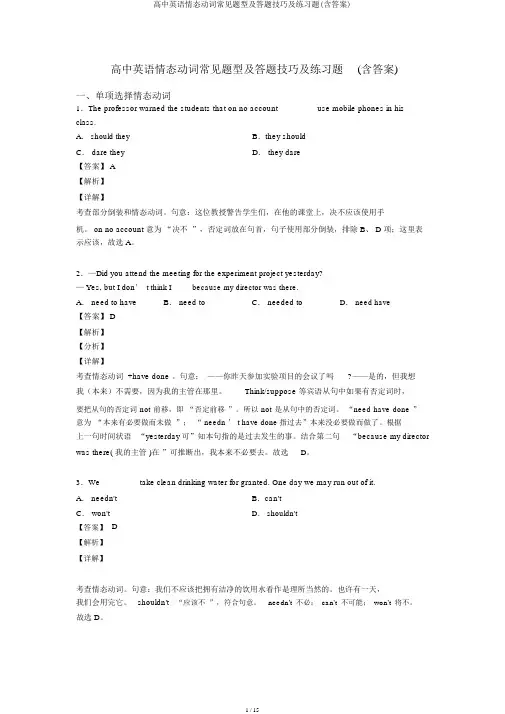
高中英语情态动词常见题型及答题技巧及练习题(含答案)一、单项选择情态动词1.The professor warned the students that on no account ________ use mobile phones in his class.A. should they C. dare they 【答案】 A 【解析】【详解】B.they should D. they dare考查部分倒装和情态动词。
句意:这位教授警告学生们,在他的课堂上,决不应该使用手机。
on no account 意为“决不”,否定词放在句首,句子使用部分倒装,排除 B、 D 项;这里表示应该,故选 A。
2.—Did you attend the meeting for the experiment project yesterday?— Yes, but I don’ t think I ____ because my director was there.A. need to have B. need to C. needed to D. need have【答案】 D【解析】【分析】【详解】考查情态动词 +have done 。
句意:——你昨天参加实验项目的会议了吗?——是的,但我想我(本来)不需要,因为我的主管在那里。
Think/suppose 等宾语从句中如果有否定词时,要把从句的否定词 not 前移,即“否定前移”。
所以 not 是从句中的否定词。
“need have done ”意为“本来有必要做而未做”;“ needn ’ t have done指过去”本来没必要做而做了。
根据上一句时间状语“yesterday可”知本句指的是过去发生的事。
结合第二句“because my director was there( 我的主管 )在”可推断出,我本来不必要去。
故选D。
3.We ________ take clean drinking water for granted. One day we may run out of it.A. needn't B.can'tC. won't D. shouldn't【答案】【解析】【详解】D考查情态动词。
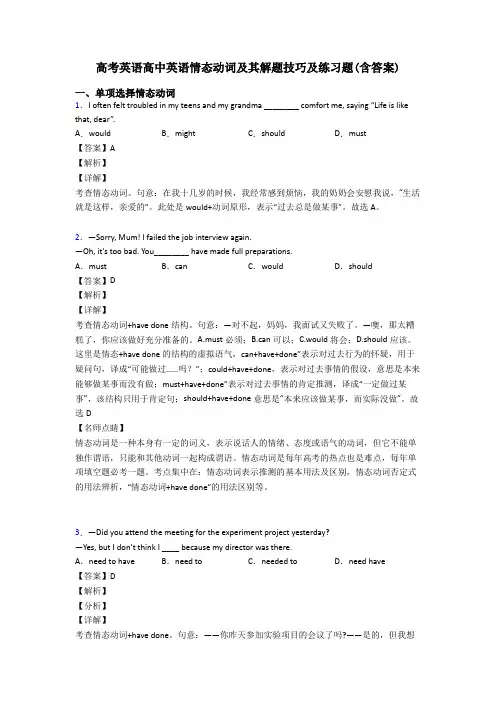
高考英语高中英语情态动词及其解题技巧及练习题(含答案)一、单项选择情态动词1.I often felt troubled in my teens and my grandma ________ comfort me, saying “Life is like that, dear”.A.would B.might C.should D.must【答案】A【解析】【详解】考查情态动词。
句意:在我十几岁的时候,我经常感到烦恼,我的奶奶会安慰我说,“生活就是这样,亲爱的”。
此处是would+动词原形,表示“过去总是做某事”。
故选A。
2.—Sorry, Mum! I failed the job interview again.—Oh, it's too bad. You________ have made full preparations.A.must B.can C.would D.should【答案】D【解析】【详解】考查情态动词+have done结构。
句意:—对不起,妈妈,我面试又失败了。
—噢,那太糟糕了,你应该做好充分准备的。
A.must必须;B.can可以;C.would将会;D.should应该。
这里是情态+have done的结构的虚拟语气,can+have+done”表示对过去行为的怀疑,用于疑问句,译成“可能做过……吗?”;could+have+done,表示对过去事情的假设,意思是本来能够做某事而没有做;must+have+done”表示对过去事情的肯定推测,译成“一定做过某事”,该结构只用于肯定句;should+have+done意思是“本来应该做某事,而实际没做”。
故选D【名师点睛】情态动词是一种本身有一定的词义,表示说话人的情绪、态度或语气的动词,但它不能单独作谓语,只能和其他动词一起构成谓语。
情态动词是每年高考的热点也是难点,每年单项填空题必考一题。
考点集中在:情态动词表示推测的基本用法及区别,情态动词否定式的用法辨析,“情态动词+have done”的用法区别等。
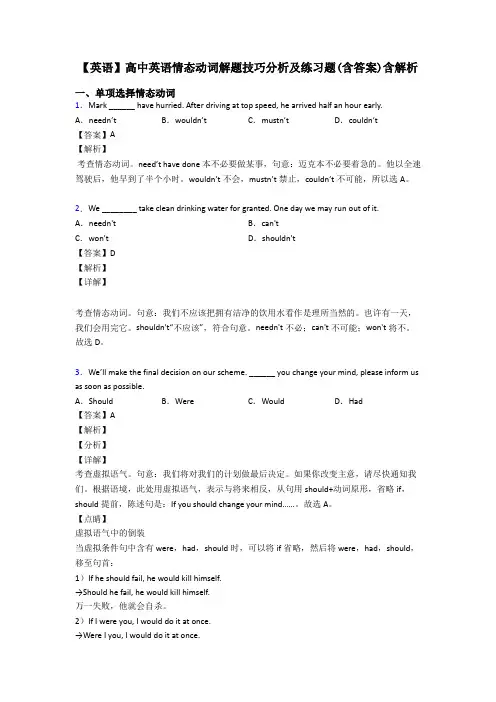
【英语】高中英语情态动词解题技巧分析及练习题(含答案)含解析一、单项选择情态动词1.Mark ______ have hurried. After driving at top speed, he arrived half an hour early. A.needn’t B.wouldn’t C.mustn’t D.couldn’t【答案】A【解析】考查情态动词。
need’t have done 本不必要做某事,句意:迈克本不必要着急的。
他以全速驾驶后,他早到了半个小时。
wouldn’t不会,mustn’t禁止,couldn’t不可能,所以选A。
2.We ________ take clean drinking water for granted. One day we may run out of it. A.needn't B.can'tC.won't D.shouldn't【答案】D【解析】【详解】考查情态动词。
句意:我们不应该把拥有洁净的饮用水看作是理所当然的。
也许有一天,我们会用完它。
shouldn't“不应该”,符合句意。
needn't不必;can't不可能;won't将不。
故选D。
3.We’ll make the final decision on our scheme. ______ you change your mind, please inform us as soon as possible.A.Should B.Were C.Would D.Had【答案】A【解析】【分析】【详解】考查虚拟语气。
句意:我们将对我们的计划做最后决定。
如果你改变主意,请尽快通知我们。
根据语境,此处用虚拟语气,表示与将来相反,从句用should+动词原形,省略if,should提前,陈述句是:If you should change your mind……。
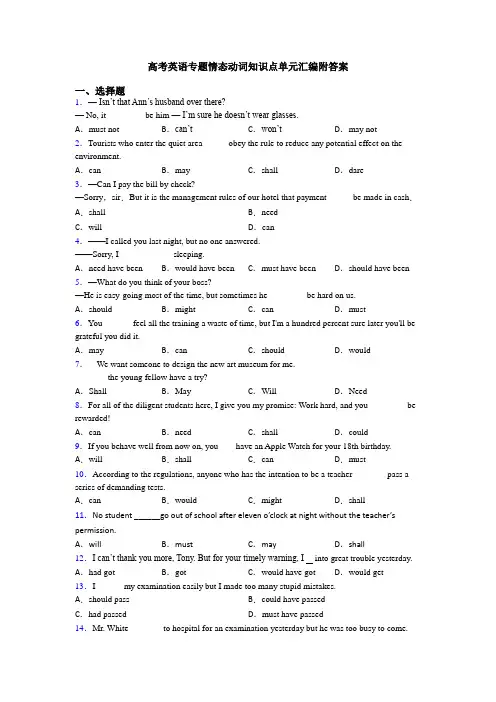
高考英语专题情态动词知识点单元汇编附答案一、选择题1.—Isn’t that Ann’s husband over there?— No, it ________ be him —I’m sure he doesn’t wear glasses.A.must not B.can’t C.won’t D.may not 2.Tourists who enter the quiet area _____ obey the rule to reduce any potential effect on the environment.A.can B.may C.shall D.dare3.—Can I pay the bill by check?—Sorry,sir.But it is the management rules of our hotel that payment _____ be made in cash.A.shall B.needC.will D.can4.——I called you last night, but no one answered.——Sorry, I____________ sleeping.A.need have been B.would have been C.must have been D.should have been 5.—What do you think of your boss?—He is easy-going most of the time, but sometimes he ________ be hard on us.A.should B.might C.can D.must6.You ______ feel all the training a waste of time, but I'm a hundred percent sure later you'll be grateful you did it.A.may B.can C.should D.would7.---We want someone to design the new art museum for me.---_____ the young fellow have a try?A.Shall B.May C.Will D.Need8.For all of the diligent students here, I give you my promise: Work hard, and you ________ be rewarded!A.can B.need C.shall D.could9.If you behave well from now on, you ___ have an Apple Watch for your 18th birthday. A.will B.shall C.can D.must 10.According to the regulations, anyone who has the intention to be a teacher _______ pass a series of demanding tests.A.can B.would C.might D.shall11.No student ______go out of school after eleven o’clock at night without the teacher’s permission.A.will B.must C.may D.shall12.I can’t thank you more, Tony. But for your timely warning, I into great trouble yesterday. A.had got B.got C.would have got D.would get13.I ______my examination easily but I made too many stupid mistakes.A.should pass B.could have passedC.had passed D.must have passed14.Mr. White _______ to hospital for an examination yesterday but he was too busy to come.A.should come B.should have come C.should be coming D.should had come 15.—Is Robert coming by coach?—He should, but he ___________ not. He likes driving his car.A.may B.could C.need D.must16.You don’t look well, you __________ see the doctor.A.ought to B.mayC.can D.might17.Sir, you ____ be sitting in this waiting room. It is for women and children only. A.shouldn’t B.will C.w on’t D.needn’t18.You ______ have been out last night, for all the lights in your room were not on.A.need B.must C.may D.should 19.(2018·天津) I can't find my purse. I___________ it in the supermarket yesterday, but I'm not sure.A.should leave B.must have leftC.might leave D.could have left20.Louis Cha (金庸) passed away. As for his achievement, there is such a comment, “He ______ the Nobel Prize for Literature with his written works translated into English.”A.could have been rewarded B.must have been rewardedC.should be rewarded D.need have been rewarded21.He ______ writing the paper now. He hadn’t written a single word when I left him ten minutes ago.A.shouldn’t be B.can’t have finishedC.can’t be D.mustn’t have finished22.The lady ________ have done something wrong, because she is looking guilty.A.would B.should C.can D.must23.I _________ my driving test but I didn’t operate carefully.A.should pass B.may passC.might have passed D.might pass24.—Sorry, Mum! I failed the job interview again.—Oh, it's too bad. You________ have made full preparations.A.must B.can C.would D.should25.You ______ have carried all these parcels yourself. The shop would have delivered them if you had asked them.A.may not B.needn't C.can't D.mustn't【参考答案】***试卷处理标记,请不要删除一、选择题1.B【解析】【分析】【详解】考查情态动词:句意:那不是安的丈夫吗?---不,肯定不是他,我确定他不戴眼镜。
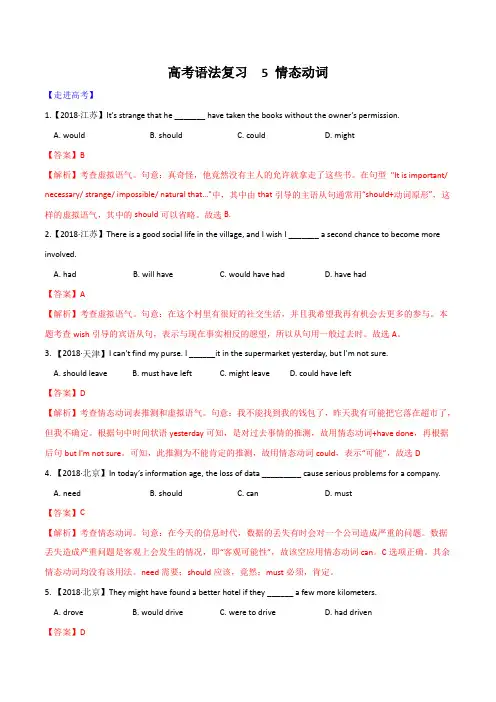
高考语法复习 5 情态动词【走进高考】1.【2018·江苏】It's strange that he _______ have taken the books without the owner’s permission.A. wouldB. shouldC. couldD. might【答案】B【解析】考查虚拟语气。
句意:真奇怪,他竟然没有主人的允许就拿走了这些书。
在句型"It is important/ necessary/ strange/ impo ssible/ natural that…"中,其中由that引导的主语从句通常用“should+动词原形”,这样的虚拟语气,其中的should可以省略。
故选B.2.【2018·江苏】There is a good social life in the village, and I wish I _______ a second chance to become more involved.A. hadB. will haveC. would have hadD. have had【答案】A【解析】考查虚拟语气。
句意:在这个村里有很好的社交生活,并且我希望我再有机会去更多的参与。
本题考查wish引导的宾语从句,表示与现在事实相反的愿望,所以从句用一般过去时。
故选A。
3.【2018·天津】I can't find my purse. I ______it in the supermarket yesterday, but I'm not sure.A. should leaveB. must have leftC. might leaveD. could have left【答案】D【解析】考查情态动词表推测和虚拟语气。
句意:我不能找到我的钱包了,昨天我有可能把它落在超市了,但我不确定。
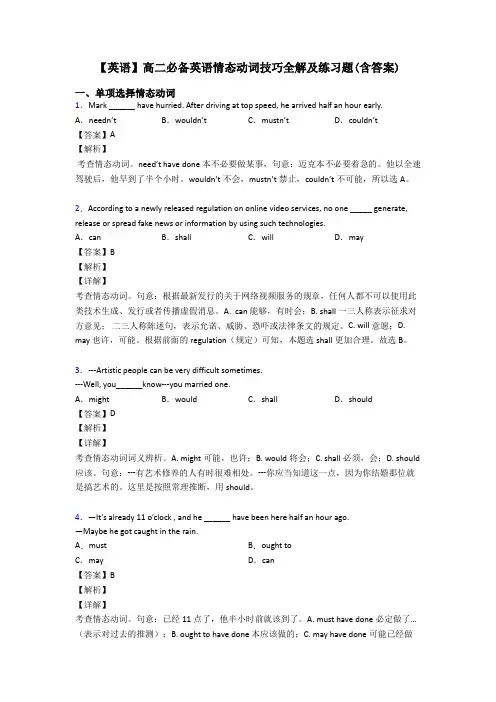
【英语】高二必备英语情态动词技巧全解及练习题(含答案)一、单项选择情态动词1.Mark ______ have hurried. After driving at top speed, he arrived half an hour early. A.needn’t B.wouldn’t C.mustn’t D.couldn’t【答案】A【解析】考查情态动词。
need’t have done 本不必要做某事,句意:迈克本不必要着急的。
他以全速驾驶后,他早到了半个小时。
wouldn’t不会,mu stn’t禁止,couldn’t不可能,所以选A。
2.According to a newly released regulation on online video services, no one _____ generate, release or spread fake news or information by using such technologies.A.can B.shall C.will D.may【答案】B【解析】【详解】考查情态动词。
句意:根据最新发行的关于网络视频服务的规章,任何人都不可以使用此类技术生成、发行或者传播虚假消息。
A. can 能够,有时会;B. shall 一三人称表示征求对方意见;二三人称陈述句,表示允诺、威胁、恐吓或法律条文的规定。
C. will 意愿;D. may 也许,可能。
根据前面的regulation(规定)可知,本题选shall更加合理。
故选B。
3.---Artistic people can be very difficult sometimes.---Well, you______know---you married one.A.might B.would C.shall D.should【答案】D【解析】【详解】考查情态动词词义辨析。
A. might可能,也许;B. would将会;C. shall必须,会;D. should 应该。
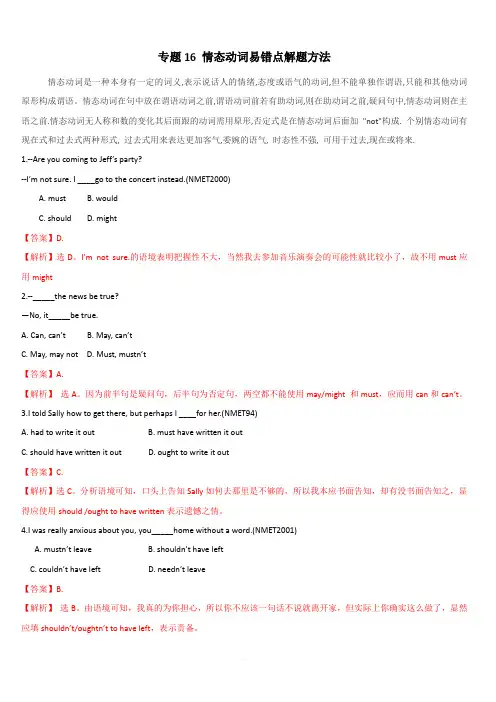
专题16 情态动词易错点解题方法情态动词是一种本身有一定的词义,表示说话人的情绪,态度或语气的动词,但不能单独作谓语,只能和其他动词原形构成谓语。
情态动词在句中放在谓语动词之前,谓语动词前若有助动词,则在助动词之前,疑问句中,情态动词则在主语之前.情态动词无人称和数的变化其后面跟的动词需用原形,否定式是在情态动词后面加"not"构成. 个别情态动词有现在式和过去式两种形式, 过去式用来表达更加客气,委婉的语气, 时态性不强, 可用于过去,现在或将来.1.--Are you coming to Jef f’s party?--I’m not sure. I ____go to the concert instead.(NMET2000)A. mustB. wouldC. shouldD. might【答案】D.【解析】选D。
I’m not sure.的语境表明把握性不大,当然我去参加音乐演奏会的可能性就比较小了,故不用must应用might2.--_____the news be true?—No, it_____be true.A. Can, can’tB. May, can’tC. May, may notD. Must, mustn’t【答案】A.【解析】选A。
因为前半句是疑问句,后半句为否定句,两空都不能使用may/might 和must,应而用can和can’t。
3.I told Sally how to get there, but perhaps I ____for her.(NMET94)A. had to write it outB. must have written it outC. should have written it outD. ought to write it out【答案】C.【解析】选C。
分析语境可知,口头上告知Sally如何去那里是不够的,所以我本应书面告知,却有没书面告知之,显得应使用should /ought to have written表示遗憾之情。
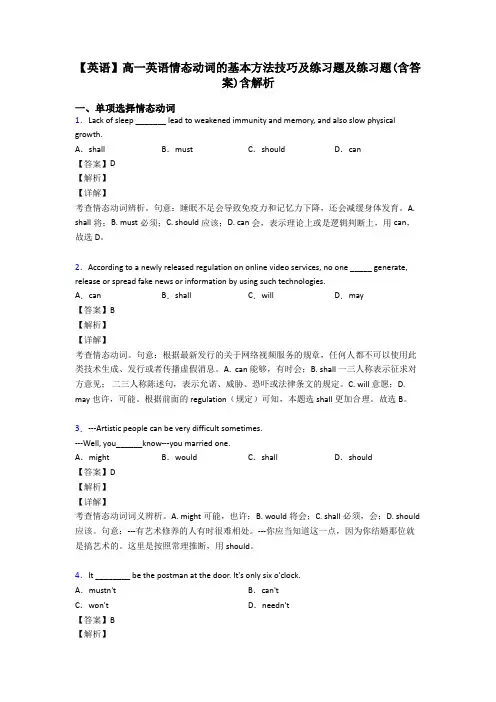
【英语】高一英语情态动词的基本方法技巧及练习题及练习题(含答案)含解析一、单项选择情态动词1.Lack of sleep _______ lead to weakened immunity and memory, and also slow physical growth.A.shall B.must C.should D.can【答案】D【解析】【详解】考查情态动词辨析。
句意:睡眠不足会导致免疫力和记忆力下降,还会减缓身体发育。
A. shall将;B. must必须;C. should应该;D. can会,表示理论上或是逻辑判断上,用can,故选D。
2.According to a newly released regulation on online video services, no one _____ generate, release or spread fake news or information by using such technologies.A.can B.shall C.will D.may【答案】B【解析】【详解】考查情态动词。
句意:根据最新发行的关于网络视频服务的规章,任何人都不可以使用此类技术生成、发行或者传播虚假消息。
A. can 能够,有时会;B. shall 一三人称表示征求对方意见;二三人称陈述句,表示允诺、威胁、恐吓或法律条文的规定。
C. will 意愿;D. may 也许,可能。
根据前面的regulation(规定)可知,本题选shall更加合理。
故选B。
3.---Artistic people can be very difficult sometimes.---Well, you______know---you married one.A.might B.would C.shall D.should【答案】D【解析】【详解】考查情态动词词义辨析。
(英语)高中英语情态动词解题技巧分析及练习题(含答案)一、单项选择情态动词1.I often felt troubled in my teens and my grandma ________ comfort me, saying “Life is like that, dear”.A.would B.might C.should D.must【答案】A【解析】【详解】考查情态动词。
句意:在我十几岁的时候,我经常感到烦恼,我的奶奶会安慰我说,“生活就是这样,亲爱的”。
此处是would+动词原形,表示“过去总是做某事”。
故选A。
2.We’ll make the final decision on our scheme. ______ you change your mind, please inform us as soon as possible.A.Should B.Were C.Would D.Had【答案】A【解析】【分析】【详解】考查虚拟语气。
句意:我们将对我们的计划做最后决定。
如果你改变主意,请尽快通知我们。
根据语境,此处用虚拟语气,表示与将来相反,从句用should+动词原形,省略if,should提前,陈述句是:If you should change your mind……。
故选A。
【点睛】虚拟语气中的倒装当虚拟条件句中含有 were,had,should时,可以将if省略,然后将 were,had,should,移至句首:1)If he should fail, he would kill himself.→Should he fail, he would kill himself.万一失败,他就会自杀。
2)If I were you, I would do it at once.→Were I you, I would do it at once.假若我是你,我就会马上做。
要是我能做此事,我一定会做。
情态动词情态动词是表达说话者的感情和语气的动词,它们的一个显著特点是不能单独使用,必须与实义动词的原形共同使用构成整个句子的谓语部分。
常用的情态动词罗列如下:Shall/should = ought to, will/would, may/might, can/could, must。
Need/dare 这两词既可以作情态动词,同时也可以作实义动词,我们称其为半情态动词。
1. shall:(1)征询对方意见或请示对方,多用于第一或第三人称的疑问句中。
如:Let’s go out for a walk, shall we?Shall he come in or stay outside? 让他进来还是在外面呆着?(2)说话者含有警告,命令, 承诺或者威胁的语气,多用于第二或第三人称。
如:You shan’t leave until six o’clock. 你不到六点不准离开。
No one shall stop me from speaking out the truth. 没有人能阻拦我说出真话。
What you have done now shall be paid for one day. 你今天所做的一切总有一天要偿还的。
(3)用在法律条约等文件中,表示义务,规定。
如:Each citizen shall carry his identification card when traveling.2.should(1) 等于ought to 表示应该。
如:You should wear school uniforms when you are at school.(2) Should 还可表示“居然”,说明说话者的惊讶和不理解。
如:It’s strange that he should have passed the driving test. 真奇怪,他居然通过驾驶考了。
(3) 可表示推断。
语法专题——情态动词情态动词框架图常见情态动词:can/could; will/would; shall/should; may/might; need;dare; must; ought to, have to情态动词基本用法:肯定形式-----情态动词+ 动词原形/ + be done/have done否定形式:情态动词+not+ 动词原形一. 情态动词的基本用法(1) can、be able to 和could①can和be able to都表示能力,意思上没多大区别。
但can只有现在和过去时(could),而be able to则有更多的形式。
但当成功地完成某一具体动作时,通常不用could而用was/were able to来表示。
这时was/were able to 相当于managed to,表示经过一番努力,终于能够完成某事。
例句:Can you use chopsticks?The wounded man still was able to get to the village and was saved in the end.②can和couldcan和could表示猜测,一般用于疑问句和否定句.例句:--Can the news be true?-It can’t be true.③表示请求、允许(表请求时,口语中常用could 代替can 使语气更委婉,回答时用can)例子:Can I go now ?-Could I come to see you tomorrow?----Yes, you can. (否定回答可用No, I’m afraid not.)④表示惊异、怀疑、不相信的态度(主要用于否定句、疑问句或感叹句中)例子:How can that be true? I can’t believe my eyes and ears.How could you be so careless.?⑤ can 的特殊用法Can but 只好can’t but 不得不can’t …too 再….也不为过,越..越好can not but do 表示“不得不/只好做”can’t help but do 没有办法只有做can’t chose but do 没有选择只能做can do nothing but do 只能做have no choice but to do 别无选择而只有例子:I can but wait.I can’t but wait.You can’t be too patient to the customers.(2) may/might①may/might表示可能,但may比might可能性大。
—Why isn’t he in class?He may be sick.(生病的可能性较大)—He might be sick.(生病的可能性较小)②may/might表示“请求、允许”,might 比may 的语气更委婉一些。
may用于现在时或将来时,might常用在间接引语中表过去时,但might也可用于现在时间,表示比较委婉的语气,这个时候might不是may 的过去时,回答用may。
例句:-----May I watch TV now ?---Yes, you may. (Yes, please)---No, y ou mustn’t.—May / Might I use your bike?—No, you mustn’t/I’m afraid notYes, you can / may/Yes, please.④may 可用于祈使句,表示祝愿。
(不用might)May we never forget each other.May you succeed!⑤ may/might as well 最好还是….., 不妨;may/might well 很可能.例句:You might as well do it now.He may well be late for class.练习:用情态动词填空1. It was so noisy that we __________ hear ourselves speak. (couldn’t)2. The next day, Nicholas went out to look for help, but he ___________ find anyone. (couldn’t)3. You __________feel all the training a waste of time, but I’m a hundred percent sure later you’ll be grateful you did it. (may)4. Nicholas __________ (may) not have survived this snowstorm had it not been for TV. (might)(3)must①must表示必须,应该,没有时态变化。
强调主观看法,只有现在时形式。
Must 开头的问句,其否定回答要用needn’t 或don’t have to 来表达。
例子:We must do it now.--Must I hand in the paper today?-Yes, you need/must.--No, you needn’t /don’t have to.②mustn’t 表示禁止做某事,表示说话者的命令或法律指令禁止,语气较强烈。
You mustn’t smoke in the office.③还可以表示主语固执、偏要做他人不希望做的事例子:It can’t help; he must do that.(4)have tohave to 表示“必须、不得不”,是由于某种外界(客观)原因而“必须”,“不得不”做某事,也可表示经常的或习惯性的事“必须”做。
have to的否定形式表示不必。
have to可用于多种时态中。
You will have to clean your own boots when you join the army.I have to be at my office every evening.(5)ought to 表示义务和责任,意为“应该”, 比should 语气要强。
例子:You ought to take care of yourself.练习:1. ---Can’t you stay a little longer?---It’s getting late. I really _________ go now. My daughter is home alone.. (must)2. You _________be careful with the camera. It costs! (must)3. You __________be Carol. You haven’t changed a bit after all these years. (must)(6)will / wouldWill 的用法①will 用于各种人称表示“意志”、“意愿”或“决心”等,否定式won’t + 动词。
I will tell you all about it.Tom won’t do such a thing.②will用于疑问句中,常用在第二称时(you)表示说话人向对方提出“请求”或“询问”。
Will you please tell her the news when you see her?Will you please go with me?③will 可用来叙述真理,表示目前习惯性动作或习惯,有“总是”、“惯于”的含义。
通常用于第三人称。
Fish will die out of water.She will listen to records alone in her room for hours .Would 的用法④would 表示客气的请求、建议或意愿,比will 更委婉,指现在时间,多用于第二人称。
Would you please be quiet?Would you like coffee?⑤would 表示过去反复发生的动作或过去的习惯。
如:When I passed my school I would see my teachers who taught me 5 years ago.We would play badminton on Sundays.(7)needneed 作“必要”讲,既可作情态动词,也可作实义动词。
①作情态动词后面直接跟动词原形need + v原形例子:Need I come?②作实义动词时后面的动词不定式要带to,sb. need(s) to do sth.I need to think it over.—Need you go now?—Yes, I must./No, I needn’t③ need 表需要时,可用want, require 替换sth need (s) to be done=sth need(s) doing sth.例子:The desk needs repairing/ to be repaired.练习:To become transparent, an animal ___________ (need) to keep its body from absorbing or scattering light. (needs)(8)daredare表示“敢”的意思。
作为情态动词时,主要用在疑问句和否定句中。
dare若作实义动词,在肯定句中要接to, 在疑问句中和否定句中to 可省去。
作为情态动词:How dare you say that?作为实义动词:She doesn’t date (to) ask her father.Do you dare (to) swim in the river ?He dares to catch a snake.(9)shall/ shouldShall的用法①shall作为情态动词用于第二、三人称,表示说话人的意愿,有“命令”、“警告、威胁、强制”和“允许”等意思。
We shall do as our teacher says.You shall have the book as soon as I finish it.You shall be pubilished.②在疑问句中,shall用于征求对方的意见或请求指示,常用于第一、第三人称。